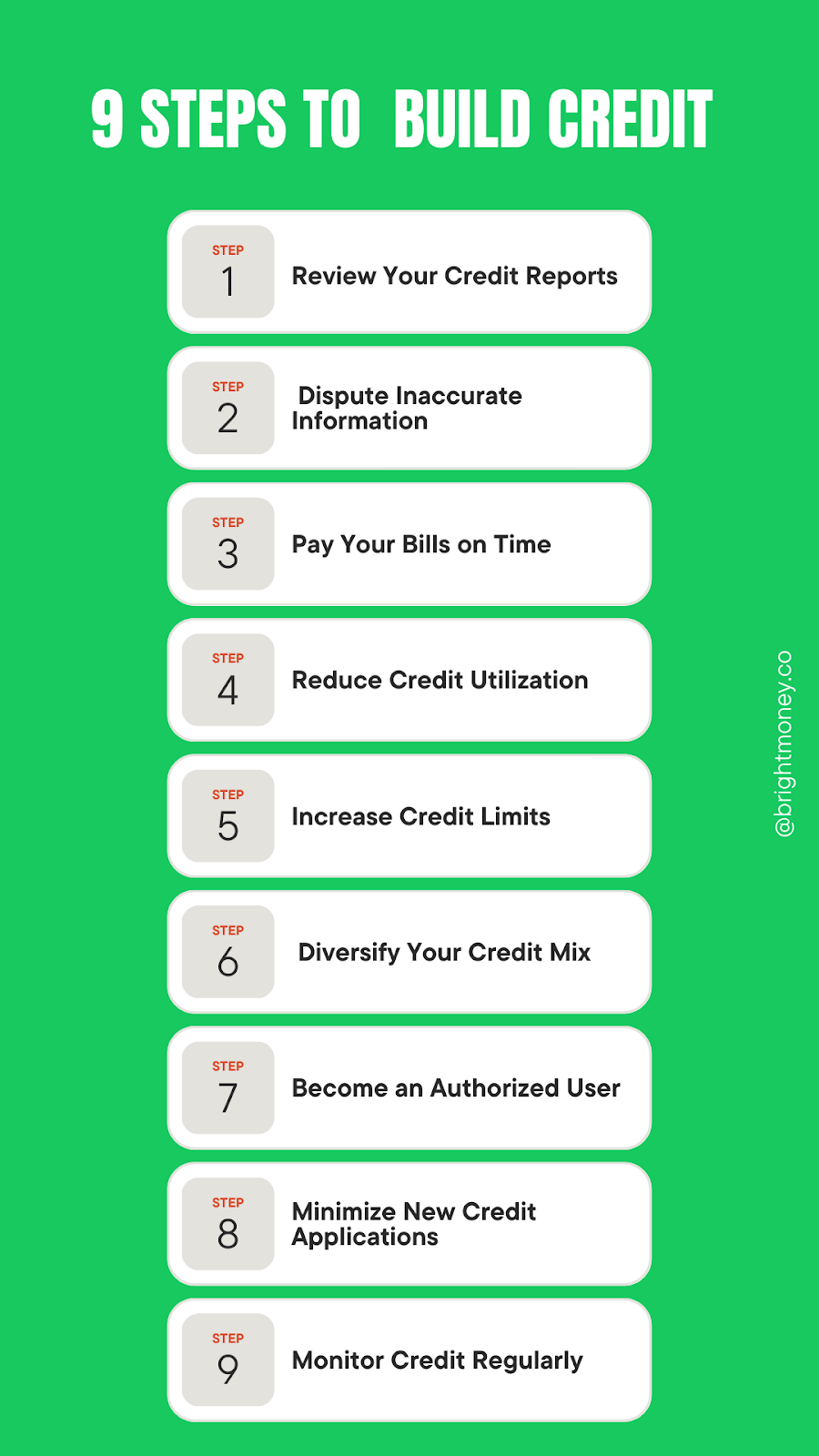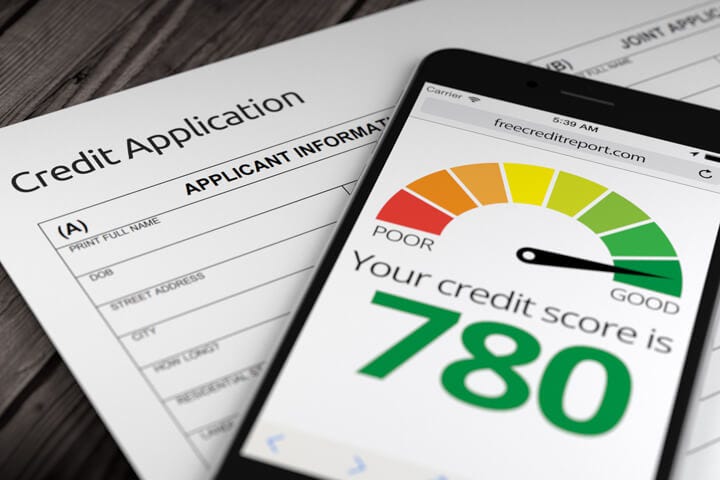You are now leaving the Bright website and entering a third-party website. Bright has no control over the content, products, or services offered, nor the security or privacy of information transmitted to others via their website. We recommend that you review the privacy policy of the site you are entering. Bright does not guarantee or endorse the products, information, or recommendations provided on any third-party website.
Did you know that 21 million Americans have credit histories that are either too old or inadequate to generate a score using the most popular scoring methods? A higher credit score opens up opportunities for better interest rates, higher credit limits, and improved financial flexibility. It reflects your creditworthiness and serves as a measure of trust for lenders and financial institutions. By implementing the right techniques, it's possible to achieve remarkable results.
This article aims to guide you through a step-by-step process of improving your credit score by 100 points. By following the strategies outlined here, you can make significant improvements to build your credit profile.
Understanding Credit Scores
One of the most popular credit scoring algorithms is the FICO Score. Higher scores indicate better creditworthiness; the range is 300 to 850. Focusing on the areas that require development may be made easier if you are aware of how the FICO Score is generated.
Know more about credit scores:
Step-by-step guide to increase credit score
Step 1: Review Your Credit Reports
Obtaining your credit reports from major credit bureaus like Equifax, Experian, and TransUnion is crucial for assessing your current credit situation. These reports provide detailed information about your credit accounts, payment history, and any negative remarks that may be affecting your score.
Equifax, Experian, and TransUnion are the three primary credit reporting agencies that gather and maintain credit information on individuals. Requesting your credit reports from each of these bureaus ensures you have a comprehensive view of your credit profile.
While reviewing your credit reports, pay close attention to any errors or discrepancies. Incorrect information can negatively impact your credit scores. If you find any inaccuracies, follow the proper dispute process to have them rectified.
Step 2: Dispute Inaccurate Information
If you identify any inaccuracies on your credit reports, you have the right to dispute them. Contact the credit bureaus and provide supporting evidence to prove the information is incorrect. The bureaus are obligated to investigate and make necessary corrections.
When disputing inaccurate information, it's essential to gather evidence such as payment receipts, correspondence, or any other relevant documents. This evidence strengthens your case and increases the chances of having the inaccuracies removed from your credit reports.
Step 3: Pay Your Bills on Time

Payment history is an essential factor in determining your credit score. Consistently paying your bills on time demonstrates financial responsibility and positively impacts your creditworthiness. Ensure that you pay all your bills, including credit card payments, loans, and utilities, by their due dates. Late payments can harm your credit score and may also result in additional fees and penalties.
To avoid late payments, consider setting up automatic payments or reminders. Additionally, creating a budget and managing your expenses effectively can help ensure you have sufficient funds to meet your financial obligations on time.
Step 4: Reduce Credit Utilization
Credit utilization usually refers to the percentage of your available credit that you're currently using. It is calculated by dividing your outstanding credit balances by your total credit limit. High credit utilization can also negatively impact your credit score. To improve your credit score, aim to keep your credit utilization below 30%. This demonstrates responsible credit management and shows that you're not overly reliant on credit.
To reduce your credit utilization, consider creating a repayment plan. Allocate more funds toward paying down your balances, starting with high-interest debts. This approach helps lower your overall credit utilization and positively affects your credit score.
Step 5: Increase Credit Limits
Increasing your credit limits can improve your credit score by reducing your credit utilization ratio. With higher limits, your existing credit balances represent a smaller percentage of your total available credit. Contact your credit card issuers and request a credit limit increase. If you have a good payment history and responsible credit behavior, they may be willing to grant you an increase.
However, be cautious not to use the higher credit limit as an excuse to accumulate more debt.
Step 6: Diversify Your Credit Mix
Lenders value a diverse credit mix, which includes various types of credit accounts such as credit cards, loans, and mortgages. Having a varied credit portfolio demonstrates your ability to manage different types of credit responsibly.
If you have a limited credit mix, consider diversifying it by applying for a new credit card or a small personal loan. However, exercise caution and avoid applying for multiple credit accounts within a short period, as this can negatively impact your credit score.
Delete Debt, Build Credit with Bright Money!
Step 7: Become an Authorized User
Becoming an authorized user on someone else's credit card, especially if it has a long and positive payment history, can potentially boost your credit score. The account's positive history is reflected on your credit reports and can improve your creditworthiness.
Ensure that the credit card issuer reports authorized user activity to the credit bureaus. Not all issuers report this information, so it's crucial to confirm to ensure it positively impacts your credit score.
Step 8: Minimize New Credit Applications
Submitting multiple credit applications within a short period can negatively affect your credit score. Each application results in a hard inquiry, which remains on your credit report for two years and may lower your score.
To focus on increasing your credit score, it's advisable to avoid unnecessary new credit applications during the 30 days. Postpone applying for new loans or credit cards until you've achieved your desired credit score.
Step 9: Monitor Your Credit Regularly
Regularly monitoring your credit is essential for identifying any changes or discrepancies promptly. It allows you to address issues proactively and take necessary steps to maintain or improve your credit score.
Several credit monitoring services provide access to credit reports, credit scores, and alerts for any changes in your credit profile. Consider utilizing these services to stay informed about your credit status.
Conclusion
Congratulations! You now have BrightMoney’s comprehensive guide to help you increase your credit score. By following the strategies outlined in this article, you can take control of your financial future and open doors to better opportunities.
Remember, improving your credit score requires discipline, patience, and consistent effort. Start implementing these steps today, and watch your credit score soar to new heights!
FAQs
Q: How long does it take to see the impact of these strategies on my credit score?
The time it takes to see the impact can vary depending on various factors. However, with diligent implementation of these strategies, you can start noticing positive changes within a few months.
Q: Are there any quick fixes to increase my credit score overnight?
There are no instant fixes to boost your credit score overnight. Improving your credit score requires time, effort, and consistent financial habits. Beware of scams promising immediate credit score improvements.
Q: Will closing unused credit cards improve my credit score?
Closing unused credit cards can impact your credit utilization ratio and potentially lowers your credit score. It's generally advisable to keep your credit accounts open unless there are compelling reasons to close them.
Q: Can I hire a credit repair company to increase my credit score?
While credit repair companies may promise to improve your credit score, it's important to exercise caution. Some companies engage in unethical practices and charge exorbitant fees. It's often more effective to follow the strategies outlined in this article yourself.
Q: Is it possible to increase my credit score by more than 100 points in 30 days?
While a 100-point increase is achievable, the extent of improvement can vary depending on your individual credit history and circumstances. Consistently implementing these strategies can lead to further credit score enhancements over time.



